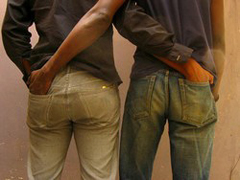
Feature Story
International Day Against Homophobia
17 May 2007
17 May 2007 17 May 2007
Homophobia is posing a critical challenge to
moving the AIDS response forward.
Widespread homophobia is posing a critical challenge to the AIDS response in many countries around the world. The International Day Against Homophobia (May 17) shines a spotlight on the urgent need for joint efforts to reduce and end discrimination, violence and criminalization based on sexual orientation.
Men who have sex with men, women who have sex with women and transgender people are all too often faced with stigma, discrimination and violence. These malevolent acts are contributing to the spread of HIV by creating an environment of isolation and exclusion which is preventing people from seeking vital HIV-related information and health services.
Today, around 85 member states of the United Nations consider homosexuality a criminal act and a small number of these countries carry the death penalty. The criminalization of homosexuality instigates widespread fear and shame, forcing people to hide their sexuality, often living in traditional partnerships and practicing in secret for fear of prosecution. Where people cannot live openly and disclose their sexuality the risk of HIV infection is often greatly enhanced as people are too afraid to access HIV prevention services for fear of repercussions or, as is the case in many countries, those services simply don’t exist.
For UNAIDS, the decriminalization of homosexuality and the eradication of violence against sexual minorities has been underlined as fundamental for progress within the AIDS response. At an international consultation on male sexual health held in New Delhi, India in September 2006, UNAIDS’ Director of Policy, Evidence and Partnerships, Purnima Mane stressed, "We have to ensure that homosexuality is decriminalized everywhere, and that homophobia, discrimination and violence against sexual minorities and women are made illegal and socially unacceptable,” she said.
However, progress is being seen, a number of governments are now advocating for the rights of homosexuals, in compliance with numerous international standards such as the Universal Declaration of Human Rights or the Charter of the United Nations.
Since Brazil first presented the draft resolution to the United Nation’s Commission on Human Rights in 2003, advocating against any kind of discrimination based on the ground of sexual orientation or gender identity, over 50 countries have publicly supported this agreement. But still more needs to be done.
“We have to face homophobia in bold and innovative ways. We all know that as long as a society is homophobic there is no way that there can be an effective AIDS response for men who have sex with men [and other sexual minorities]," said Purnima Mane.
Venezuela celebrates ‘A Day Against Homophobia’
Each year, HIV awareness raising activities take place around the world on the International Day Against Homophobia. In Venezuela, UNAIDS is taking part in one such activity by promoting the "Guide on human rights, health and HIV: a strategic guide to prevent and fight discrimination due to sexual orientation or gender identity". This document was prepared by the International Centre for Technical Cooperation on HIV/AIDS, UNAIDS and the Horizontal Group of Technical Cooperation and was recently launched at the IV Latin American and Caribbean Forum on HIV/AIDS held in Buenos Aires.
Venezuela ’s "Day Against Homophobia" celebrations will take place in Merida, a western Andean city that hosts one of the most active and solid Venezuelan civil society networks, the “Merida League Against HIV and AIDS”.
As well as the distribution of the guide, UNAIDS and the Merida League will hold an interactive workshop that will cover basic concepts on sexuality, sexual human rights, and vulnerability to HIV.
“This is the second year in a row that Venezuela celebrates the International Day against Homophobia with activities that raise awareness on this important issue. In accordance with regional initiatives, the launching of this guide, particularly among youth, will promote respect and tolerance towards the gay, lesbian and transsexual community,” said UNAIDS Country Coordinator Venezuela Libsen Rodríguez-Adrian.
Links:
Read Press Release ( en | sp )
Guide on human rights, health and HIV: strategic guide to prevent and fight discrimination due to sexual orientation or gender identity ( sp )
Read the State of Homophobia, ( en | sp ) published by the International Lesbian and Gay Association (ILGA), or visit their website at http://www.ilga.org/
Watch ILGA's video "A Day Against Homophobia" (mpeg, 3,840kb)
Read the Yogyakarta Principles ( en )
Read the International human rights references to human rights violations on the grounds of sexual orientation and gender identity
International Day Against Homophobia
Key populations:
Men who have sex with men
People in prison settings
Uniformed services
Cosponsors:
WHO
UNDP International Day against homophobia and transphobia
Press centre:
Read statement by UNAIDS Executive Director
Multimedia:
Video message from UNAIDS Executive Director
Feature stories:
Anti-homophobia campaign to end discrimination in Latin America (16 May 2009)
El Salvador: Ministerial decree to reduce homophobia in health services (03 April 2009)
HIV prevention hampered by homophobia (13 January 2009)
External links:
Publications:
Reducing HIV stigma and discrimination: a critical part of national AIDS programmes - a resource for national stakeholders in the HIV response (pdf, 1.07 Mb.)



